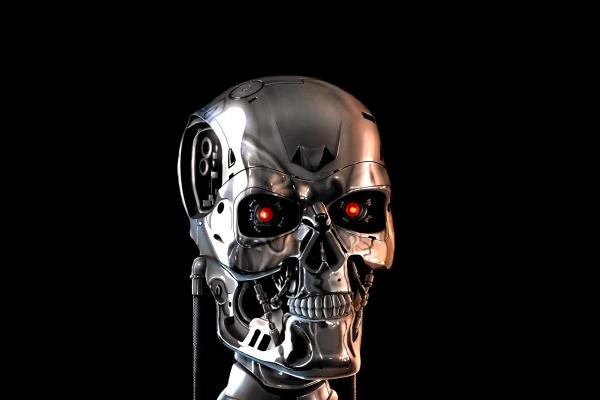Published on the 15/05/2017 | Written by Adam Hosker

With 2017 set to be the biggest year yet for Artificial Intelligence, Adam Hosker ponders the future and finds it bright…
With much being discussed in the media about how AI is the single greatest threat to mankind, let’s examine the issues, dispel some of the myths and see how these systems are being used today. Well-known commentators including Elon Musk and Stephen Hawking have surmised that AI could be a major threat to humanity. Hawking and Musk, however, are not talking about the kind of technology that is in use today. The confusion sets in because the term AI is so broad. Sensational media headlines cloud the facts. Plus, most of us have seen the Terminator films and they frightened the life out of us. Many technologies in regular use today were once deemed to be AI. For example, ‘spellcheckers’ were considered an area of AI in the 1970s and 80s. These capabilities are now simply viewed as clever algorithms at best if not just things we take for granted. Two decades ago, the most advanced AI system in the world was IBM’s Deep Blue, the computer system that beat Garry Kasparov at Chess in 1997. Deep Blue was a rules-based algorithm using a brute force tactic to win at a game that has a limited number of outcomes. In 2011 IBM took things to the next level with Watson, beating two previous Jeopardy champions in a live version of the game show. More recently, Google’s Deep Mind AlphaGo beat the World Champion of Go, a game infinitely more complex than chess. This illustrates an advance in the science, because Go involves potentially millions of outcomes and requires a decision-making process outside the capabilities of simple brute force methods. Deep Mind’s ability to assess fluid situations and make decisions sets it apart from preceding systems. 3 Key Types of AI Existing systems from Google’s Deep Mind, to IBM Watson and Microsoft’s Machine Learning systems are considered ANI. Both AGI and ASI are theoretical. Even IBM’s Jeopardy-winning Watson, the best-of-breed of these technologies, is still only considered ANI. Sensationalised or a genuine worry? While great strides have been taken in recent years due to the lowering price of computing power, the increase in available data sets and the advent of cloud computing, the ‘Singularity’ still sits firmly between the realms of theory and science fiction. However, before embarking on a road that could lead to an ASI, it is necessary to consider the implications and put safeguards in place. Until we understand what consciousness is and discover more about neuroscience, it seems at best highly unlikely in the foreseeable future. Computing has never tackled the complexity of the influence of hormones and chemical releases in the body and the algorithms taking place in the brain in decision-making and creativity. With that in mind it is not something that should stop us from using the kinds of tools that are available using certain elements of intelligence or human-like skill to make advances in various fields. Fears of the ‘Singularity’ didn’t stop us from using spellcheck; perhaps a similarly pragmatic approach should be taken to these next generation tools. What can AI systems do today? Mobile devices have long used basic AI features such as speech-to-text with apps like Siri, Cortana and more recently Amazon’s Alexa. In many industries from Law to Healthcare, far more is being done using Natural Language Processing with contextual awareness. Common AI in use today includes: Will AI destroy mankind – or save lives Owen Johnson from the Leeds Institute of Data Analytics, in an article in ‘The Conversation Journal’ commented on a trial where the institution used Watson Explorer Content Analytics software to analyse 50 Million pathology and radiology reports. “Recognising the sensitivities (around patient data), we brought IBM Watson to the data rather than passing the data to IBM. Using natural language processing of the text reports we double-checked diagnoses such as brain metastases, HER-2-positive breast cancers and renal hydronephrosis (swollen kidneys) with accuracy rates already over 90 percent. Over the next two years we’ll be developing these methods in order to embed these Machine Learning techniques into routine clinical care, at a scale that benefits the whole of the NHS.” Some 357,000 people per year are diagnosed with cancer in the UK, annual spending on cancer treatment is £12bn of the overall NHS annual budget of £117bn. With the use of effective health informatics systems underpinned by AI & Cognitive computing expected to improve the effectiveness of cancer referrals, the potential for reducing costs and improving outcomes is enormous. Geoff Hall Associate Medical Director for Informatics at Leeds Teaching Hospital said, “Enhanced early referral to cancer services will improve clinical outcomes and the health economic argument writes itself. The latest components to this technology also includes genealogy mapping, allowing personalised treatment plans based on the genome of the individual and the MSK Watson for Oncology Solution to assist oncologists with the most up to date treatment options within defined peer reviewed parameters. Overall, technologies like this are beginning to greatly improve patient survival rates and quality of life through early detection and personalised treatment options. Outside of medicine, AI holds promise in a range of industries, similarly providing the potential to reduce manual, repetitive tasks, reducing costs to customers and allowing practitioners to do more with less. These industries include law, financial services, and many more. The point is that AI isn’t ‘coming’. It is here. In many instances, it is embedded in everyday products and services which demonstrate why AI is such a good thing for humanity. It makes life easier, better and more efficient. It allows people to do more with less. It is a companion which helps us every day – and as AI technology continues to evolve, it will add ever more value to the lives of individuals and to society. Based in the United Kingdom, Adam Hosker is an Intelligent Systems & Business Data Specialist at Software One.
There are essentially three key types of AI.
Musk and Hawking are troubled by ASI or the ‘Singularity’, a super-intelligence that has developed self-awareness and consciousness. It is this kind of entity that is almost always the subject of AI science fiction.
AI systems are being used in automated cars like those from Tesla, while Google and many other major automotive manufacturers are developing similar capabilities. Gabriella Compostella, Senior Data Scientist at VW’s Data Labs, recently told an audience at the Royal Society STEM conference in London, that the company expects to produce a significant volume of vehicles with full driverless automation by 2025.
In healthcare, limited resources of both physicians and funds and the huge demands on time mean this kind of technology is not only revolutionising the sector, it is saving lives.




























